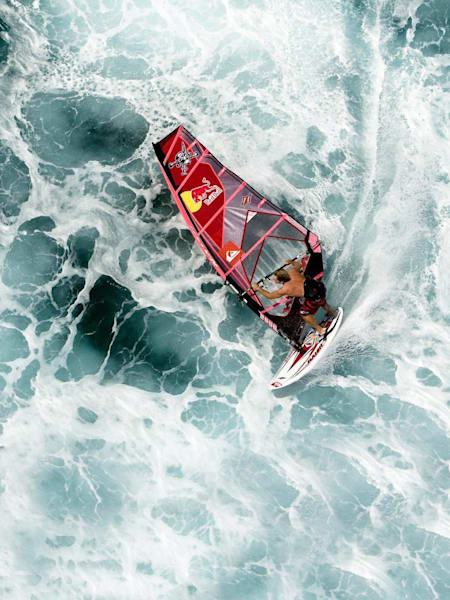When it comes to icons in the world of windsurfing Robby Naish is windsurfing royalty and he's the first person to have gained long-lasting fame in the sport.
In 1968, Robby’s father, surfer Rick Naish, moved his family from California to Hawaii. There, Robby took up the exhilarating sport of windsurfing and, at age 13, won his first overall world championship title. After dominating the windsurfing world he translated his dedication to kiteboarding and has also turned his hand to mastering SUP. We talked to the watersports ambassador as he celebrates his 55th birthday.
What's the secret to your success?
No secret, I love what I do, I’m really stubborn and I’m really focused, but I think in terms of generalising, secret to success? Pick something you love, and stick with it, and work really hard.
Was there one moment in your career you consider to be the defining moment?
Probably my first title in the Bahamas in 1976 because that started everything. It’s kinda been a blur ever since, fortunately most of it good.
What's it like to be a defining force in the industry as both an athlete and a developer?
It’s been super-cool, I like to think that I’m still doing it too which is nice. It’s been a process and an evolution it’s kind of reinvented itself a couple of times. I consider myself even today, more as an athlete than a business guy or a product guy and the business and the development has been a side benefit to the athletic side. Being there in the beginning of windsurfing and running it all the way through its evolution over 40 years, being in kiteing right in the beginning, stand up, and now foiling; I have been really lucky to be in the right place at the right time a bunch of times, so it’s been fun.
What does the future look like?
It’s hard to say, hopefully bright and long, I don’t know, I have never questioned the future until recently. So, I guess I’m a little more scared of it than I used to be, in many ways. I’m just crossing my fingers and see what happens.
What’s happening with foiling and how that is developing?
It’s going to get more people on the water in a different way. It’s taking advantage of conditions that aren’t much good for anything else, crappy waves, boat wakes and that kind of thing, which is fantastic. Expanding kitesurfing into a fun, technical realm for a lot of guys, especially the older guys, who don’t want to be jumping anymore and have been kiteing for a while and the novelty has maybe worn down, foiling adds a whole new fun aspect of it.
Especially in lighter winds, for windsurfing, huge potential in light winds. That’s what I’m focusing on and my brand is focusing on is the light wind. Bringing people back to windsurfing everywhere, instead of having to windsurf when it’s 15-20 knots which doesn’t happen in a lot of places, so just simple gear that’s easy to ride that you can ride in light winds.
Surfing, it’s a whole new adventure for a lot of guys, so the good guys want to do it, the old guys want to do it, so I think there’s a huge potential in surfing. Both in the stand-up side, the downwind-ers, wave foiling on a stand-up, even more so short-boarding, paddling in and foiling.
I think Kai Lenny [pictured above] shed light on what’s possible, now we have tons of people at home who are absolutely ripping, little kids, old guys. The learning curve is really quick. That accessibility, and the fact that you don’t have to be a superhero, multi-sport talented guy to do it, makes it really attractive. So there’s a lot of potential there and a lot of fun. It’s awesome.
For me personally it’s killer, especially with the injury, it was 90 percent of what I was doing. I think that’s what gave us such a head start on the light wind gear, as that’s all I had been doing for the last year, is really focusing on how can I get on the water and not hurt myself. How can I nurse my injuries and still get out there and be productive, and foiling has been really good for that.
Who changed your career? How?
It’s hard to say, I started my career when I was 13. It’s been just a flowing thing that has taken different directions over the years. Nobody and everybody. There were no moments where it was a slap in the face, change of direction. Everything has been very flowing and organic. Kinda like surfing, rode one wave, and riding that one kicked over to another. There’s never been that time where I was stuck on the inside getting sets on the head, fortunately.
Björn Dunkerbeckchanged my career at one point. After I was number one in the world for ever and ever, winning everything, then he beat me. That was a whole new perspective, having to work really really hard, change my style, change my equipment, not be the best guy. It was good for me. Jason Polakow changed things again when he came in and approached things from a really different style and make everyone ride more aggressively and differently.
I could probably go on and list people from different generations over the years changed and rolled. Young guys became old guys and other young guys came in. With each generation of new friends that I’ve ridden with, my style has changed and my direction has changed, and in some cases the sport that I’m doing has changed or at least added more sports to it.
But no one person who has come in and changed everything. You become your surroundings. I’ve had really cool people around me my whole life my whole career, shaped who I am and the sports I do. A lot of people.
What are you are utterly obsessed with, and why?
Board riding. Because it’s the only thing I’m good at and it’s really fun.
Do you have a life mantra? What is it?
Life’s what you make it and every day on the water is a good day.
For you, what does it mean to be a waterman? What's the significance of this? How does it change you as an athlete?
I’ve always hated the label, I think it’s over used. I don’t even call myself a waterman, I’m a surfer. A waterman to me is a guy who fishes and dives. It’s changed over the years. Now a waterman is a guy who surfs and he can sail and he can swim, and he can carry rocks under the ocean and train because it looks good in videos. I think the term waterman has become this self-promoting mentality. I think somehow the waterman thing for me has been over used and redefined. The true waterman is not going to be the guy you’re going to see in a magazine or a YouTube video.
What is something most folks don’t know about you?
I hate boats, I get really really sea sick, really really easily. Which people seem to think is really funny for a guy who makes his living on the ocean. I don’t like fish. I don’t really eat seafood. I’m very politically incorrect.


















